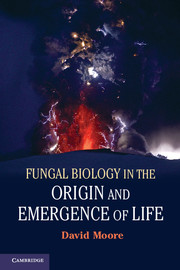Book contents
- Frontmatter
- Contents
- 1 Learning from life on Earth in the present day
- 2 Essentials of fungal cell biology
- 3 First, make a habitat
- 4 The building blocks of life
- 5 An extraterrestrial origin of life?
- 6 Endogenous synthesis of prebiotic organic compounds on the young Earth
- 7 Cooking the recipe for life
- 8 ‘It’s life, Jim . . .’
- 9 Coming alive: what happened and where?
- 10 My name is LUCA
- 11 Towards eukaryotes
- 12 Rise of the fungi
- 13 Emergence of diversity
- References
- Index
4 - The building blocks of life
Published online by Cambridge University Press: 05 February 2013
- Frontmatter
- Contents
- 1 Learning from life on Earth in the present day
- 2 Essentials of fungal cell biology
- 3 First, make a habitat
- 4 The building blocks of life
- 5 An extraterrestrial origin of life?
- 6 Endogenous synthesis of prebiotic organic compounds on the young Earth
- 7 Cooking the recipe for life
- 8 ‘It’s life, Jim . . .’
- 9 Coming alive: what happened and where?
- 10 My name is LUCA
- 11 Towards eukaryotes
- 12 Rise of the fungi
- 13 Emergence of diversity
- References
- Index
Summary
Our present understanding is that the Universe is between 12 and 15 billion years old and recent experiments and observations suggest that for almost all of that time most of the elements that we now know in the Periodic Table have been present and there has also been an abundance of spontaneously synthesised molecules, most of these being organic molecules. These exist in the interstellar medium of our own Milky Way Galaxy and other galaxies, and in our Solar System.
Max Bernstein (2006) starts the abstract of his article on prebiotic materials with these sentences:
One of the greatest puzzles of all time is how did life arise? It has been universally presumed that life arose in a soup rich in carbon compounds, but from where did these organic molecules come?
(Bernstein, 2006)Before showing how Max Bernstein answered his own questions, I want to ask (and answer) the question where did these ‘universal presumptions’ come from? As with many aspects of modern biology, we can look back with expectation of enlightenment to the writings of Charles Darwin.
Although Darwin’s Origin of Species is still widely believed by many to refer to the origin of life, this was not a question the book addressed. His book was instead about where existing species come from. The short answer is that they are genealogically descended in an unbroken reproductive series from earlier species. But what did Darwin think about the origin of life? In the Origin of Species he wrote ‘I should infer from analogy that probably all the organic beings which have ever lived on this earth have descended from some one primordial form, into which life was first breathed.’ Although a few years later in 1863 Darwin wrote to his friend the botanist Joseph Dalton Hooker: ‘I have long regretted that I truckled to public opinion and used Pentateuchal term of creation, by which I really meant “appeared” by some wholly unknown process.—It is mere rubbish thinking, at present, of origin of life; one might as well think of origin of matter.’ Yet despite these cautious protestations we can clearly glean from his occasional references to the origin(s) of life that Darwin believed that life arose by purely natural causes as simple micro-organisms in an aquatic environment on Earth.
(van Wyhe, 2010)- Type
- Chapter
- Information
- Fungal Biology in the Origin and Emergence of Life , pp. 52 - 61Publisher: Cambridge University PressPrint publication year: 2013



